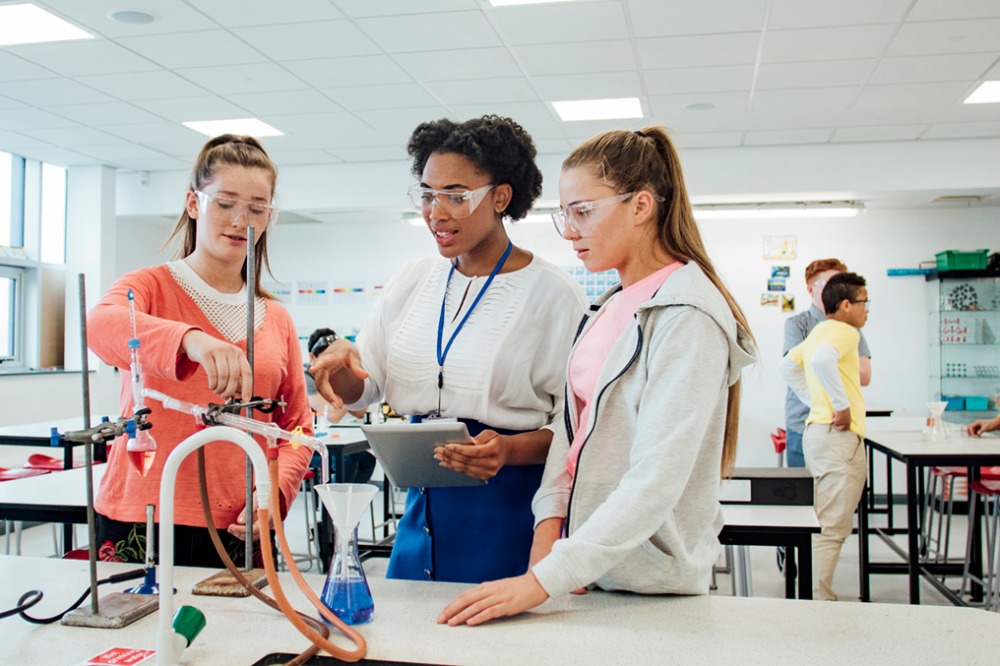Students at Caister Academy in Norfolk take part in Challenge Days where they can practise essential skills required for work.
Caister Academy in Norfolk, East Anglia, works with the Skills Builder Partnership training staff to develop students’ essential skills and running Challenge Days and trips to local employers. The school recognised that the Skills Builder Framework and resources could help fill skills gaps it had already identified across Key Stage 3.
Staff have been using the framework to help structure education around employability, rigorously building essential skills step by step.
It provides a common language for teachers and students, allowing teachers to praise students explicitly when they apply the skills, positively reinforcing their learning.
As a result, students are now able to talk in detail about the strategies they have used, identifying their own strengths and weaknesses as well as the skill step they are currently building. Principal Michelle Strong attests: “We have pupils in Year 9 who are now able to talk about essential skills and transfer them to different subject areas.”
Other teachers note students’ enhanced confidence in activities such as presenting to their class.
Essential skills identified by The Skills Builder Partnership
- Listening
- Presenting
- Problem solving
- Creativity
- Staying positive
- Aiming high
- Leadership
- Teamwork
Collaborative challenges
As with literacy and numeracy skills, it’s crucial to start young and to keep going when it comes to instilling essential skills in students, so that they can build on their learning as they move up through the school.
One way Caister Academy achieves this is through Challenge Days, where students focus tightly on skills development by taking part in a collaborative challenge.
The tasks are engaging, hands-on and centred around a particular theme that relates to the world beyond the school gates. This serves to bring it to life, helping students to make the link between skills built in class and their future careers.
We have pupils in Year 9 who are now able to talk about essential skills and transfer them to different subject areas
Challenge Days are fully resourced and run in school, delivered by teachers with the Skills Builder team’s support on the day. The team launches it with an assembly, after which the students work in teams through a series of related challenges linked to a central question.
These run best when teaching and learning is classroom-based, as there is an opportunity to reflect on the skills being applied and the skills students are using.
For schools, they are simple to prepare, cross-curricular and run at cost value by the Skills Builder Partnership in line with its role as a not-for-profit social enterprise organisation.
At Caister, students experience multiple Challenge Days. The consistent use of a common language for teaching skills helps to keep it simple: students and teachers are always on the same page about what is being taught, making explicit teaching much more effective.
Similarly, when employability is a regular part of the school curriculum, staff are much more confident teaching essential skills explicitly. This familiarity makes it easier to measure progress over a longer period, allowing for more targeted practice and long-term planning.
Examples of challenge days for secondary schools
- Year 7 – Greeting cards: Students explored the world of enterprise by running their own start-up greetings-cards company. They built teamwork and problem solving skills, managing a production line, ensuring everyone in the team contributed to the final design while producing quality cards as swiftly as possible.
- Year 8 – A day in politics: Leadership and presenting skills were honed through students launching their own political parties. Diving headfirst into the political arena, they researched policies of existing parties before sharing ideas in a passionate debate. They created their own manifestos and presented to the class before a final vote.
- Year 9 – Operation moonbase: Students worked to establish a new society on a distant moon. They developed ‘creativity and aiming high’ skills by developing ambitious infrastructure ideas in their groups. Teams selected suitable crew members to bring their vision to life within tight budgets and even tighter deadlines. Finally, they pitched their plans to ‘UN representatives’.
About The Skills Builder Partnership
The Skills Builder Partnership brings together more than 700 organisations towards a common mission, joined by a shared language, principles and outcomes. https://www.skillsbuilder.org/
















